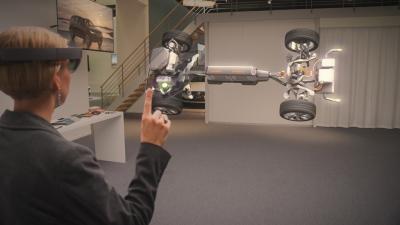Buying a new car can oftentimes be as tiring a task as scraping peanut butter off the floor mat, but it looks like it’s going to get much easier — and cooler — like “show me the X-ray specs right now” cooler.
More brands — especially in auto — are experimenting with virtual, mixed and augmented reality devices to offer tailored capability. At this year’s L.A. Auto Show, car companies were already experimenting with AR experiences for their current and prospective customers as an integrated part of their marketing plan — specifically Hyundai and their AR instruction manual.
It’s all part of a process that reimagines the car-buying experience. More importantly, it affords people mobility and the convenience of shopping socially.
“Shopping will be tailored in VR,” said Henry Stuart, co-founder and CEO of Visualise, a UK-based VR production company, per Wired. “It will only show stuff that’s relevant to you, and you will be able to pick things up in the virtual world and feel them, as well as playing with them, before you start to buy them.”
Stuart said “it will be possible to have full-body scans and then meet friends online where clothes will be tried on, all without leaving the house.”
A Walker Sands study found that 66 percent of respondents expect to receive their first drone-delivered products within the next five years. It’s just another sign that the retail experience is gradually shifting — and car companies are identifying that.

Last month, Volvo announced a partnership with Microsoft HoloLens that reimagines the car-buying experience and how customers encounter and explore a vehicle. Volvo offered a glimpse of this mixed reality experience using its soon-to-be-released S90 model. “By stripping the car to its skeleton, the demo creates an opportunity for users to fully engage in a vehicle’s features. It takes imagination, and makes it real, falling only short of test driving it. Think of it as a virtual showroom where you’re allowed to configure vehicles in entirely new ways,” said Bjorn Annwall, Volvo’s senior vice president of marketing, sales and services.
Microsoft and Volvo’s union adds another immersive wrinkle in the changing world of customized commerce and showrooming, specifically leading to new sales opportunities for car makers to maximize. Imagine salesmen visiting a customer’s home by bringing the car inside their living room.
“HoloLens offers the freedom to create a bespoke experience which customers can steer themselves. Imagine using mixed reality to choose the type of car you want — to explore the colours, rims or get a better understanding of the features, services and options available,” said Annwall.
Microsoft teamed up with Ayzenberg to produce a short documercial capturing this demo and examining the thinking behind it. “Not everyone will get to experience it in person,” said Matt Bretz, vice president and creative director for Ayzenberg. “HoloLens’ mixed reality offers a deeper than the heads-up-display quality of AR, but also allows you to stay connected with your real-world surroundings in a way the VR simply can’t.” (Editor’s note: [a]listdaily is the media arm of the Ayzenberg Group.)
Earlier this year, Audi introduced VR headsets for car configuration to its showrooms, dubbing it as the “dealership in a briefcase.”
“Hand in hand with our dealers, we are bringing digital innovations into the dealership in order to improve convenience and to provide even better advice,” said Luca de Meo, a marketing executive for Audi.
Ford is furthering its footprints in the VR industry through its “Immersion Lab.”
Elizabeth Baron, a VR and advanced visual technology specialist at Ford, told Fortune the company builds fewer models and creates more virtual ones as part of a holistic and collaborative process while “accepting more configurations and making choices earlier in the design process thanks to VR.”
“The impact on cost, time and quality are significant, and have allowed our designers and engineers more creative freedoms to explore options that in the past would have been to time- or cost-intensive to consider,” Ford’s senior technical leader Jeff Greenberg said, per Fortune. “We have worked on some level with companies like Facebook, Microsoft, HTC, Valve, and Nvidia and have developed our VR technologies to quickly realize the advantages of new hardware and software.”
The human-centric vision brands are reaching is fascinating. The arms race to reach new dimensions intensifies by the day as they challenge each other to push the innovation envelope. It’s also a test for retailers to consistently correct and even reinvent the consumer experience.

